Syria: Emergency Response & Recovery
More than eleven years after it began, the war in Syria is far from over. The numbers are frankly staggering: an estimated 11.1 million people are in need of assistance, more than half of all people in Syria are food insecure, 2.1 million children are out of school, and over 50% of basic infrastructure in the country is non-operational or completely destroyed. The fact that 1.2 million people are now living in hard-to-reach areas, combined with the continued armed clashes in many areas, complicates the delivery of humanitarian assistance.
The severity of needs is especially high in Aleppo, Idlib, Damascus, Rural Damascus, Deir-ez-Zor and Raqqa governorates. At the same time, the ongoing conflict is fueling displacement on a scale rarely seen in human history: 6.1 million people are currently estimated to be internally displaced, many for the second or third time. These multiple displacements, compounded by difficulties finding work and widespread physical destruction, have exhausted people’s capacity to cope with the prolonged conflict.
Ongoing aid
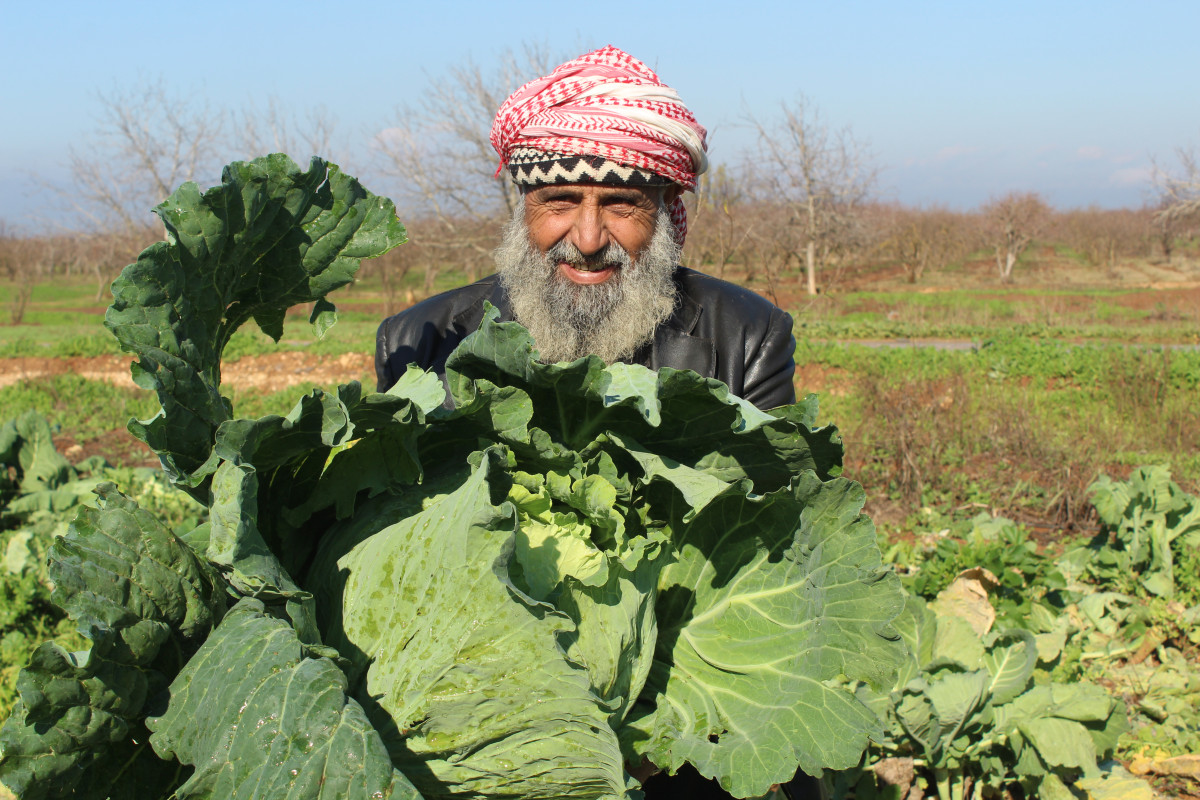
Livelihoods & Agriculture
Agricultural production in Syria has also plummeted since the start of the conflict, driving up prices for vulnerable families. Since 2014, People in Need has been training small farmers and providing them with vouchers to purchase much-needed seeds, fertilizers and tools.
Our cash-for-work activities provide short-term, temporary employment to vulnerable families to earn money through debris collection, street rehabilitation, repairing irrigation canals and schools, sowing school uniforms, and restoring water and power networks. This activity provides households a reliable income to meet their own household needs, promoting resilience and dignity whilst supporting communities and stimulating local markets.
- 1,226 farmers received vouchers for seeds and tools in 2020
- In 2020 19,090 people were supported through our cash-for-work programme
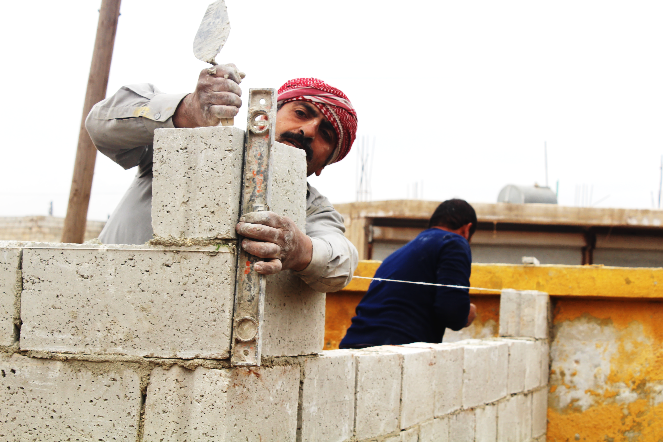
WASH - Water, Sanitation and Hygiene
Since 2013, People in Need has helped to restore public water wells and networks, construct water points and elevated water tanks, rehabilitate and extend sewage systems, build landfills, provide generators and renovate or install toilets and showers in camps and schools. We work with local authorities and contractors to carry out this work and improve the management of basic water, sanitation and hygiene services. Our cash-for-work programmes employ people to clear debris, renovate water networks and collect waste, thereby supporting rehabilitation efforts while at the same time offering vulnerable families a dignified way to earn an income.
- In 2020, 269,578 people benefited from improved access to water as a result of our programmes
- In 2020, 351,300 individuals benefited from improved sanitation or waste removal services creating a healthier, safer living environment for them
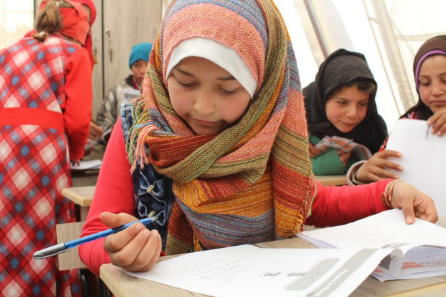
Education and Psychosocial Support
2.4 million children in Syria -over one third of Syria’s child population- are currently not in school. The challenges are enormous: a staggering 40% of school infrastructure has been damaged or destroyed by now. The UN is able to confirm nearly 700 attacks on education facilities and personnel in Syria since the verification of grave violations against children began. In 2020 alone, 52 attacks were confirmed.
People in Need has been providing educational support in Syria since 2013. Working in partnership with schools, we provide a holistic support package that includes funds to rehabilitate damaged buildings, specialized training for educational staff, teacher kits, fuel for heating, water, and monthly staff incentives. We also provide schoolbags and stationary for students, and furniture such as desks, tables and whiteboards. We currently reach 27,372 pupils between the ages of 5 and 17 to access safe quality learning opportunities.
PIN also provides basic psychosocial support (PSS) for children by organising various creative workshops and games led by trained staff. The time spent with children as part of these extracurricular activities helps them cope with the traumatic events that have occurred their lives. For children living in temporary camps without any way to access formal education, PIN opened temporary learning centres. We also run remedial classes and compensatory courses to help children catch up on years of lost education, and we hold open days with the aim of attracting more children into schools.
In addition, parents of children not attending school have the opportunity to earn an income through PIN’s “Cash for Work” programme. This improves household budgets so that parents can afford to send their children to school and, most importantly, ensure children are not compelled to work.
PIN supports child-friendly spaces, that function as a safe, fun and inclusive space for children to learn, play, socialise, and develop. These centres are established in internally displaced camps, and provide basic psychosocial support to improve the well-being of children by organising various PSS activities as well as structured recreational activities focusing on creativity, mobility and theatre led by educated and trained staff. These activities are prepared by assistants in close collaboration with the facilitators themselves, which teach children how to develop trust, build self-confidence, deal with emotions and situations, develop interpersonal skills, create awareness on topics present in their households/families and daily lives. Furthermore, the child-friendly spaces function as a platform with easy access for sectors and activities (WASH, health, nutrition) and for trained staff to identify children with protection concerns to be referred for specialized assistance if needed.
After COVID-19 global pandemic was declared in March 2020, PIN timely worked with teachers and facilitators in northern Syria to develop a distant learning methodology that ensured continued education while the schools and learning centres were closed.
Read a story od 12 years old Aya.
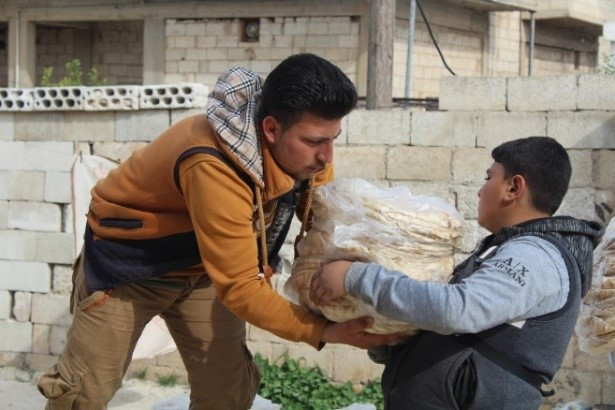
Food security
We also support hundreds of selected bakeries each month, providing thousands of families with access to more affordable bread.
- Each month 13,420 families receive food parcels
- Each month 8,500 families receive monthly food vouchers
- In 2020, more than 4 million subsidised bread packs were baked, reaching 315,000 individuals
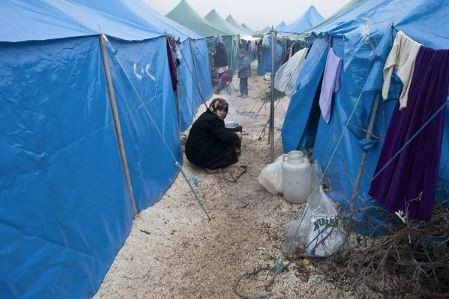
Non-food items & Shelter
Additionally, we distribute essential items to the most vulnerable families, especially those who have been recently displaced to camps or informal settlements due to the conflict. For these families, who are living under very severe conditions and with few belongings of their own, PIN provides essential items like kitchen kits providing all the basic items required for cooking, mattresses, blankets, clothes, and hygiene kits. To help survive the bitter cold winter months, we also distribute heaters and cash grants for fuel.
- 3,077 people received assistance to help prepare for the winter of 2020/2021
- 15,888 households supplied with non-food items such as mattresses, blankets, clothes, and kitchen items
- 1,069 households received assistance to ensure adequate shelter, through the provision of tents and household rehabilitation
- 531,000 individuals benefited from public infrastructure rehabilitation, such as health clinics, schools, markets
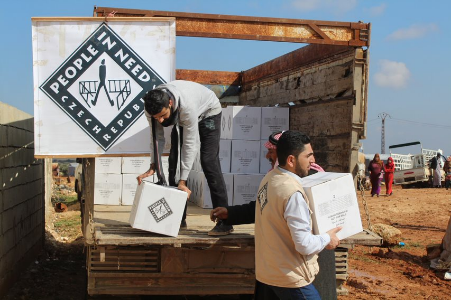
Emergency response
- In 2020, we provided a monthly average of 23,667 ready-to-eat rations (RTERs) or food kits for families in the immediate aftermath of displacement or other crises
- 18,050 hygiene kits provided to households from PIN in 2020, containing essentials such as soap, towels, dishwashing liquid, jerry cans, and buckets, thus giving people the tools to improve their own hygiene and safety.
- In 2020, 20,929 individuals benefited from emergency once-off cash grants to assist highly vulnerable people to buy food, water and other essential items







